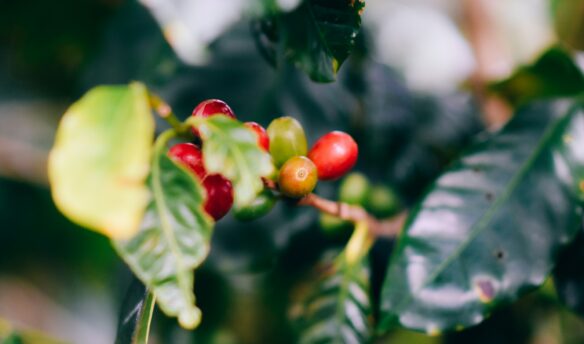Have sustainability initiatives been beneficial for coffee farmers? Farmers and consumers disagree. Plus: International coffee chains eye Italian expansion, and how much coffee do we have warehoused at ports? In the US, nobody knows.
‘Survey: Coffee Farmers and Consumers Have Different Perspectives on Sustainability’ – via Daily Coffee News
How would you answer the question, “Do you think the sustainability movement has been beneficial for coffee farmers?” A survey by Rural Voices put this question to US coffee consumers and Honduran coffee farmers, and the difference in answers was stark.
Although not clearly defined in the article, the sustainability movement could include efforts over the past few decades to address the coffee industry’s negative impacts on the environment and many of its participants. When asked if this movement has benefited producers, 78% of consumers answered “yes,” while just 31% of farmers answered the same question in the affirmative.
The pilot survey—with an admittedly small sample size of 150 consumers and 100 farmers—looked closely at sustainability and the future of coffee, breaking the topic into three parts: environmental, social, and economic. Consumers said the environmental element was the most important, while farmers thought economic sustainability was the most vital.
Participants were also given a list of eight generally acknowledged pathways to improve sustainability in the coffee sector and asked to rank them from most to least important. Consumers ranked actions like “providing training and education,” “requiring sustainability certifications,” and “supporting community projects in farming communities” about evenly. Farmers, meanwhile, thought “paying farmers better prices” and “buying directly from farmers” were the most critical pathways.
“A key to improving sustainability in the coffee industry is to listen to the voices of all stakeholders, including farmers and farmworkers,” Daily Coffee News writes. “Effectively including the voices of farmers and farmworkers will help us to understand each other better and work together towards solutions that work for all relevant parties.”
‘How Much Coffee Are Americans Drinking? Soon Nobody Will Know’ – via Bloomberg
For decades, the Green Coffee Association (GCA) published a monthly update that tracked the amount of coffee held in warehouses at American ports. This data helped analysts, traders, and roasters judge supply and demand: is imported coffee being roasted and sold, or is demand falling and green coffee being stockpiled at the port?
Now, suddenly, GCA has stopped publishing that data—with no explanation. The move was so sudden that it reportedly took the group’s member companies and even its board by surprise. Both Bloomberg and Daily Coffee News reached out for comment, but GCA declined to provide a reason.
Theories abound as to the thinking behind GCA’s move. Some traders drew parallels to a recent decision by the European Coffee Federation to stop publishing port-by-port data and instead issue less specific, aggregated reports. Others speculated that GCA is planning to monetize its data. “There have been several series of data that went behind a paid firewall and members only,” said Judy Ganes of J. Ganes Consulting. “It sure makes reporting on the market tougher.”
The move will make deciphering coffee trends and market shifts within the US more difficult. “The US port stock data has been a beacon of certainty for many years,” said analyst Carlos Mera from Rabobank. “There is no replacement for it.”
Read the full story at Bloomberg or via Yahoo! News here.
‘International Brands Eye Opportunities in Italy’s Hallowed Coffee Culture’ – via World Coffee Portal
Italy holds a special place in the wider coffee culture, and Italians prefer buying coffee from independent cafes: the market share for independent shops was 90% in 2020. It took Starbucks, famously inspired by Italian coffee, 47 years to open a location in the country, and residents openly criticized and resisted the chain when Starbucks opened its first flagship store in Milan in 2018.
Today, resistance is subsiding, allowing Starbucks to double its footprint in the country in 2022 (still only 25 locations). Other international companies are now eyeing the country—Pret A Manger from the UK is the latest to make its Italian debut—and already-arrived brands like McCafé are looking to expand.
The article linked above, from World Coffee Portal, gives a few reasons for foreign chains’ lack of foothold in Italy, specifically citing price sensitivity and mythos around espresso. The cost of a shot of espresso was capped at €1 for years, making it hard for international interlopers to compete (a twist from the usual story of big companies undercutting independent stores).
Although growing, Italy’s chain coffee shops are still a tiny fraction of the overall market: in 2019, there were over 57,000 cafes, the vast majority independent outlets. Although the overall number of cafes has fallen somewhat in recent years, World Coffee Portal estimates that there are only about 1,160 chain cafés in Italy, or about 2%. For comparison, the UK has nearly 10,000 chain cafes.
More News
‘Uganda Coffee Report: Record-High Production Driven by Young Robusta’ – via Daily Coffee News
‘Fairtrade Report Reveals Consumer Support Remains Strong Despite Global Cost of Living Crisis’ – via Global Coffee Report
‘Coffee Society Members Protest Disposal of Their Land’ – via Nation Kenya Edition
‘Celebrity-Backed Brand Chamberlain Coffee Raises $7 Million More’ – via Daily Coffee News
‘Tasting Table Is Wrong About Americanos’ – via Sprudge
‘Old Seattle Starbucks Location to Become Black Coffee Northwest’ – via Seattle Times
The Week in Coffee Unionizing
- As Pride Month begins, Starbucks Workers United is calling on the company to end its “corporate performatism” and bargain in good faith with its unionized stores. “This Pride let’s set the record straight—Starbucks is not pro-LGBTQ,” the union tweeted. “They do not take care of their queer workers. They are not an ally. They are a corporation waging a war against their workers who are fighting for protections.” The union is demanding health and safety and discrimination protections, reinstatement of trans healthcare, which it says Starbucks reduced last year, and “a real voice in a company that loves to tokenize us.”
- A National Labor Relations Board judge ruled that a Starbucks location in Wichita, Kansas violated labor law during the store’s union drive, which failed by one vote. The judge cited the company’s “proclivity” for breaking the law and ordered the store to end its union-busting activity. The judge ruled that managers reduced store hours and told workers they could lose benefits if they unionized. “I am so grateful for this verdict,” said former barista Maia Cuellar-Serafini. “It means that the truth is out. It tells everyone who Starbucks really is: a multi-billion-dollar company who is determined to undermine the rights of workers any way they can.”
- A Starbucks store in Milwaukee, Wisconsin, voted to join the union after allegations of union-busting from workers during the campaign. Meanwhile, 21 Starbucks stores filed for unionization in May, which according to Starbucks Workers United, shows that the movement is not slowing down.
Is Coffee Good For You?
We’re narrowing our focus this week: coffee could increase your risk of dementia, but only if you drink a lot using a specific brewing method.
A new study published in Nutrients investigated the effects of coffee and tea consumption during midlife on the development of dementia in later life. It found that those who drank six or more cups of “boiled coffee” each day had a higher risk of developing Alzheimer’s disease than those who drank zero or one cup per day. Other types of coffee didn’t seem to have an effect either way.
Previous studies on the link between coffee and dementia have been inconclusive. This research from Norway used data from the Trøndelag Health Study and followed 7,381 participants with an average follow-up time of about 22 years. For this study, individuals aged 70 and older were given self-reported questionnaires to determine their coffee intake.
The study defines boiled coffee as made “by boiling or infusing coarse ground coffee for 5–10 min and is not filtered through a paper filter.” Although the authors acknowledge that this brewing method isn’t widely used, “current popular methods, including French press, Turkish, and Greek coffee, have comparable amounts of cafestol and kahweol due to the absence of a paper filter.”
Cafestol and kahweol are diterpenes, a molecule present in boiled coffee but trapped when brewing filter coffee. These compounds have been linked to higher cholesterol, which can increase the risk of cardiovascular diseases and, ultimately, dementia.
The study didn’t find a significant link between general coffee intake and dementia, but those who consumed six or more cups of boiled coffee did have an increased risk of Alzheimer’s. Those who drank four to seven cups had more of a chance of developing mild cognitive impairment, which could lead to dementia.
The researchers conclude: “Since coffee and tea are among the most widely consumed beverages worldwide and cognitive decline is common among older adults, even minor potential health benefits or risks associated with coffee and tea consumption could have a significant effect on public health.”
Beyond the Headlines
‘The Magic Of Small Coffee Shops’ by Valorie Clark
‘“Carbon Neutral” Coffee: Climate Accountability or Marketing Spin?’ by Fionn Pooler















